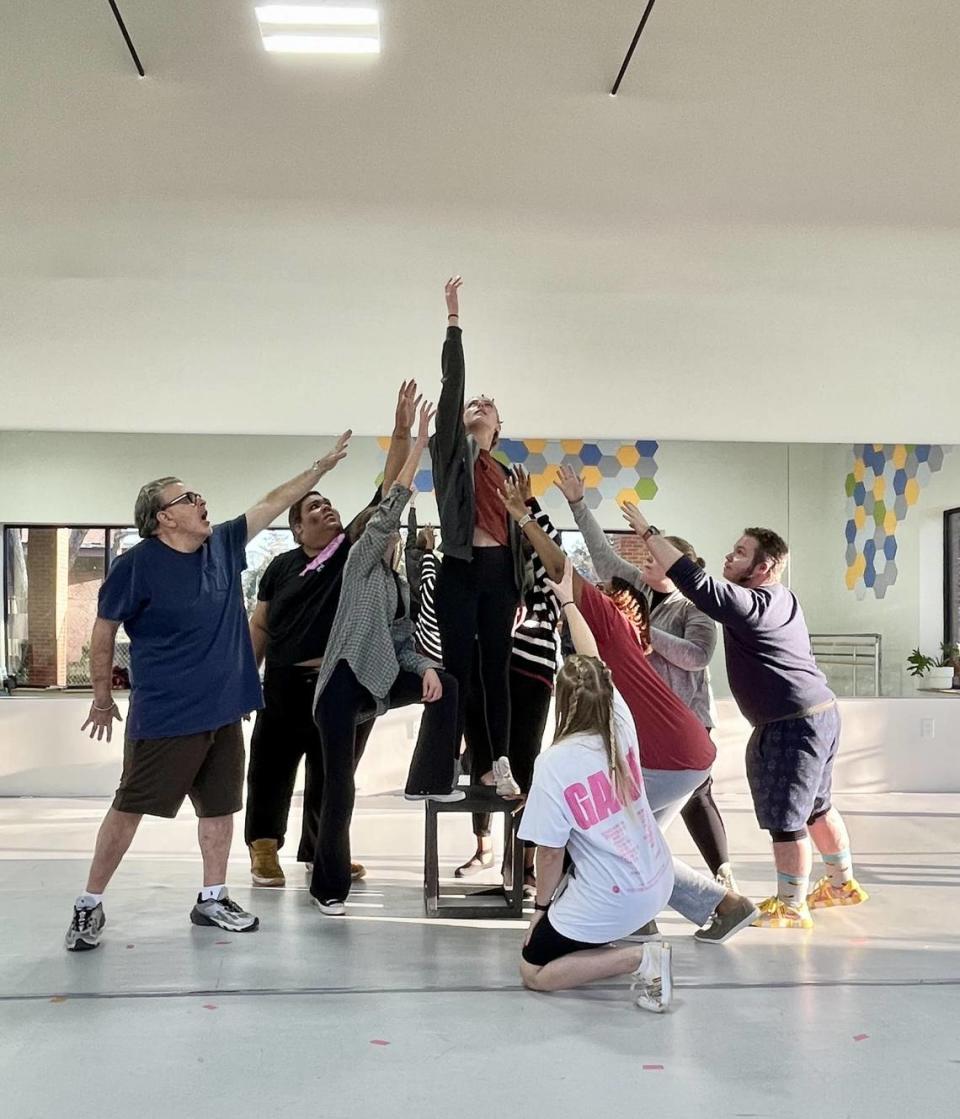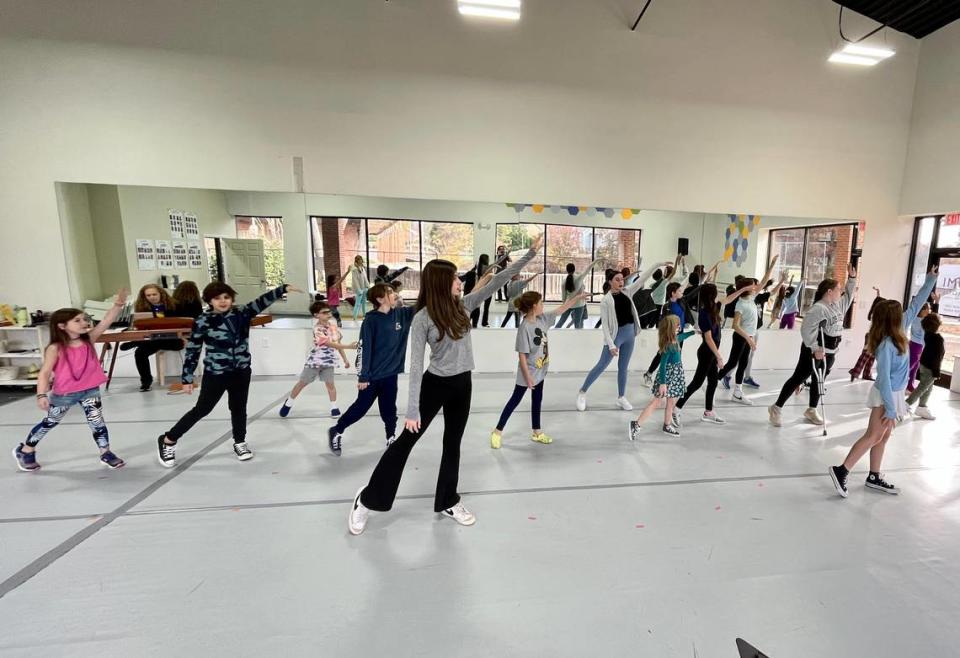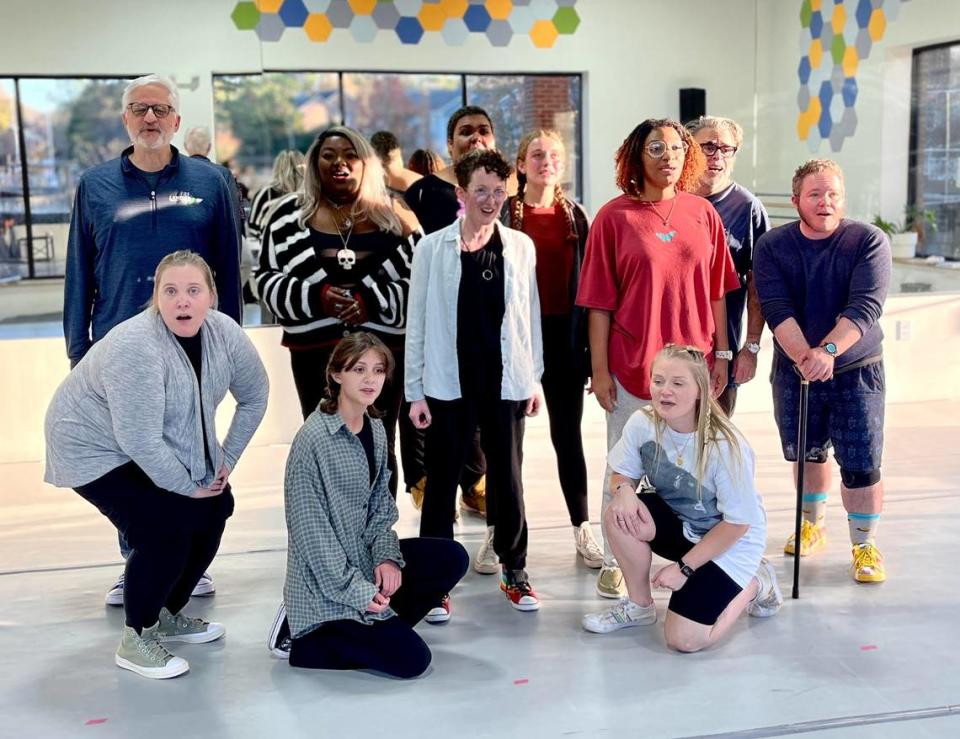The Lotus Project aims to inspire creativity and grow community one production at a time
At first, the choice of 1970s musical “Godspell” as the debut production for The Lotus Project, a newly-formed local theater company, might seem a bit dated. But founders Susan Cherin and Kayla Piscatelli insist that their selection was intentional because of the show’s timeless theme and important message — emphasizing the importance of community.
“We both look at it (“Godspell”) as a story of what a leader in this world is supposed to be,” Piscatelli says. “It is a story of a leader who is building community out of a group of people who come from all different walks of life.”
Cherin agrees. “In the play, the leader brings everyone together and says ‘These are the things that make us good humans, these are the ways we build community, these are the way we foster relationships, these are the ways that we empower ourselves and others, these are the very small things we can do every day to change the world – to forgive each other, love each other.’”
“It reinforces that there really are these very small, daily acts of kindness or charity that can change the world for the better,” Cherin says.
The Lotus Project is at once a theater company and much more — Cherin and Piscatelli also offer classes, camps and corporate workshops.
The Lotus reference is also multidimensional. The lotus flower is significant in many cultures for its ability to “rise above the mud.” This also has metaphorical significance for Cherin and Piscatelli who are guided by their focus on bolstering community connections and empowering individuals. The word LOTUS also serves as an acronym for their organizational tenets: Listen, Observe, Talk, Understand, and Share.

Planting the seeds
Long before The Lotus Project came to be, Cherin and Piscatelli worked together at Levine Jewish Community Center, where they expanded its community theater program (Theater at the J), into a vibrant, creative incubator that produced shows and developed complementary programming, including theater workshops and youth camps.
Over time, they realized their enthusiasm and commitment to inclusivity was something special. So, too, was their organic mode of collaboration. Part of this was owed to their being work colleagues for a decade–their being life partners also enhanced their understanding of one another’s work styles.
And though COVID initially paused any in-person convening, it forced them to pivot and offer young people the opportunity for creative expression at a time when they were “basically going to school on a computer all day every day,” Cherin says.
They first started helping students with their homework online. During breaks, they would incorporate arts activities – singing, dancing, acting and more. Students looked forward to these moments, and their enthusiasm spilled over into their interactions outside the group.
It was during this time that both saw the power of the arts in real time. While acknowledging the negative realities that the pandemic wrought, Piscatelli is also quick to appreciate its silver linings.
“I think coming out of that experience, we were able to just take our work to the next level in terms of the difference that we felt like we made in the kids and the families’ lives by using the arts as a vehicle for self-empowerment and conflict resolution,” she says.
Making the arts inclusive for all
While The Lotus Project is a woman- and LGBTQ-owned theater company, those lenses are not the only perspectives that Chenin and Piscatelli reinforce. Instead, their guiding force is inclusivity. In terms of their programming, Chenin says, “We want to primarily amplify voices that have not been heard enough.”
One example the pair cite is their upcoming audition process for the classic film and musical “Grease,” which will feature performers in grades 6-12. Many readers are likely familiar with the storyline of the 1978 film, which starred John Travolta and Olivia Newton-John as Danny and Sandy – two people who watch their summer fling fizzle once school starts and the differences in their personalities are emphasized.
The dramatic tension of the story, which hinges on whether the two will get back together, culminates in Newton-John’s character reinventing her appearance and demeanor to attract Travolta – thereby turning herself into something she’s not.
It’s precisely this kind of message that The Lotus Project aims to challenge.
“We’re trying to change the terrible message of the show, which is like, change yourself for another person to like you,” Piscatelli laughs.
“This is a show that everyone loves and is such fun music, but we want to push back against its message and specifically work on it with teens who are facing similar issues – that is, wanting to be themselves yet wanting to fit in,” she adds.
To that end, casting will be open – meaning, students are not bound by gender conventions nor preconceived notions. Instead, they are free to audition for any part that speaks to them.
“Most places are not going to do that,” Cherin says. “They’re going to cast Danny as a cisgender male and they’re going to cast Sandy as a cisgender female. We are going to just allow all of the teens, regardless of their gender identity, to audition for whatever role they feel is the right role for them.”

Finding a space and a place for everyone
Two additional aspects that distinguish The Lotus Project’s approach are its Sundays-only rehearsal schedule and its willingness to accept all who wish to participate.
Cherin and Piscatelli note that the demands of a full rehearsal schedule for youth and adults often can be too much.
“A lot of people can’t participate in a full production, basically for two reasons,” Piscatelli says. “One, most of them are every night, or five or six nights of rehearsal for six weeks. And parents, kids – that is, regular people – just are not able to participate in something like that. It’s too much; it’s too much time.”
Adds Cherin: “And the second reason is because maybe their skill is not to the point that they can get in based on one audition. Those are often the two factors that prevent people from performing.”
Their solution? One day a week of rehearsal, but for a longer period of time – 12 weeks instead of six.
And instead of a make-or-break audition, theirs became a placement audition.
“So if you show up and you say, ‘I want to perform in the ensemble,’ you can,” Cherin says.
Youth under 18 pay a $200 participation fee to support programming expenses, which allows Cherin and Piscatelli to avoid making cast cuts (though financial assistance is available). Both are committed to this “come one, come all” collective attitude.
“We have done shows in our past with up to 90 people and the people have the best time,” Piscatelli says. “And it just doesn’t seem to impact for us the quality of the show because everyone wants to be there.”

Writing their own script for creative collaboration
The partners in life and business are generous not only in recognition of the talent of their actors, but in each other, as well.
“Susan is awesome in our work because she has big, huge, brilliant ideas,” Piscatelli says with a smile. “And then I can work to figure out how to operationally execute those ideas. That is the way in which we complement each other. (But) why we work so well together, can other times challenge both of us.”
A friend once told the two that every good relationship needs a popcorn kernel and a popcorn popper. That analogy helped them understand why they work together so well.
“That actually really helped us to put structure to the idea of different brains, because my brain is the kernel and Kayla’s brain is like the popper – she does the magic that helps bring these ideas to life,” Cherin says.
At the end of the day, Piscatelli says, The Lotus Project is not about creating perfection in its final product – it is about the process and the possibilities that open up for participants.
“I don’t need any of their art to be like, it’s gonna hang in a museum,” she says. ”Their art is beautiful because it is theirs. They are dancers because they are dancing; they’re singers because they’re singing. They are wonderful, incredible, beautiful human beings because they exist.”
Cherin agrees. “And interestingly, that takes us right back around to the themes of ‘Godspell.’ That’s why it sort of felt like the perfect choice (to begin with), because at its core it’s about community and building relationships, and also how we treat one another in the world.”
How to watch
“Godspell” at HUG Charlotte, 2920 N. Tryon St.
Friday, Dec. 1 at 7 p.m.
Saturday, Dec. 2 at 2 and 7 p.m.
Sunday, Dec. 3 at 3 and 6 p.m.
Tickets: https://www.thelotusprojectnc.com/ticket-sales
More arts coverage
Want to see more stories like this? Sign up here for our free “Inside Charlotte Arts” newsletter: charlotteobserver.com/newsletters. You can join our Facebook group, “Inside Charlotte Arts,” by going here: facebook.com/groups/insidecharlottearts. And all of our Fall Arts Guide 2023 stories are here: charlotteobserver.com/topics/charlotte-fall-arts-guide

